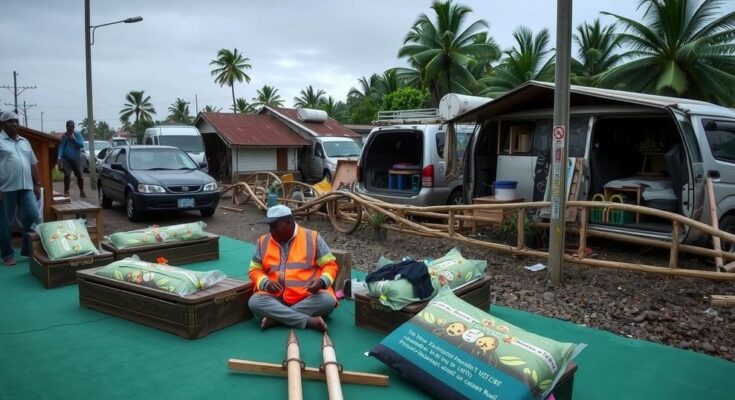Comoros has declared a week of national mourning following Cyclone Chido’s devastation in Mayotte, where casualties may reach several hundred, particularly among marginalized communities. France is dispatching aid, yet the cyclone’s extensive damage complicates rescue efforts amidst a crumbling infrastructure and urgent humanitarian needs.
In response to the devastation caused by Cyclone Chido, Comoros has declared a week of national mourning, a period that is set to last until Sunday. This move comes after the cyclone severely impacted Mayotte, a nearby island where tragedy is expected to claim “several hundred” lives, predominantly in shantytowns which house many Comorans. President Azali Assoumani announced the mourning period as the islands grapple with tragic losses and infrastructure damage resulting from winds exceeding 220 kilometers per hour which battered Mayotte on Saturday.
Mayotte, which remains a French territory, has been overshadowed by this cyclone, the most severe in nearly a century. Recent reports suggest that approximately half of its official population of around 320,000 comprises migrants, predominantly from Comoros. This issue is compounded by irregular immigration, which makes estimating the true population and corresponding casualties particularly challenging. After the disaster, the shantytowns were left in ruins, intensifying concerns about potential victims.
Efforts to provide immediate relief have been initiated by France, deploying ships and military aircraft to Mayotte, which remains in a critical recovery phase. Emergency services have faced significant challenges, with extensive damage to roads hindering access for rescue teams and supplies. Basic necessities such as water and electricity have been disrupted, compounding the urgency for aid, particularly for vulnerable populations, including children.
As officials assess the situation, Prefect François-Xavier Bieuville indicated a potentially catastrophic death toll, estimating casualties in the hundreds or possibly thousands. Difficulty in accurately counting the dead is anticipated due to local customs of burying the deceased promptly and the presence of undocumented migrants. Efforts are underway from France and the nearby French territory of Reunion to ensure that essential support reaches those in need effectively.
Cyclone Chido struck Mayotte at an alarming intensity, reaching category four status—the second highest classification on the cyclone scale. This region, known for its high population density and economic struggles, had not experienced such severe weather in decades. The cyclone’s impact on communities, especially in informal settlements, underscores the vulnerability of populations in densely populated areas. Moreover, the ongoing irregular migration between Comoros and Mayotte complicates the situation, as many who reside there do so without proper documentation, making rescue operations and casualty assessments challenging. The broader international response, especially from France, plays a crucial role in addressing urgent humanitarian needs in the wake of this natural disaster.
In summary, the catastrophic effects of Cyclone Chido on Mayotte have necessitated a formal declaration of national mourning in Comoros, as fears of significant casualties loom. The immediate focus is on coordinated rescue and relief efforts, underscoring the gravity of the humanitarian crisis at hand. The events highlight the ongoing challenges faced by impoverished populations in disaster-prone areas, necessitating an urgent response from regional and international entities.
Original Source: www.arabnews.com




